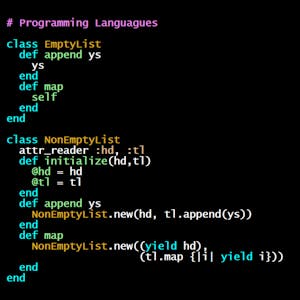Embark on a transformative journey through the world of programming languages with the "Programming Languages, Part C" course. This advanced segment, the final part of a comprehensive 3-part series, focuses on functional programming, leveraging languages such as ML, Racket, and Ruby to explore fundamental concepts while imparting a broader understanding of language constructs and effective program design. Participants are guided through a rich learning experience that transcends the confines of syntax, emphasizing the development of robust, reusable, composable, and elegant programs.
The course assumes prior programming experience and successful completion of Parts A and B. Through a structured approach, learners are empowered to grasp the underpinnings of modern languages, paving the way for effective programming in any context. With a strong emphasis on functional programming, participants delve into the roots of pivotal ideas and emerge equipped to build software with a fresh and beautiful perspective.
Unveil the potential of programming languages, cultivate a deeper understanding of software development, and unleash your creativity in building innovative solutions. Join this transformative course to elevate your programming prowess and embrace the art of elegant program design.
Certificate Available ✔
Get Started / More Info
Programming Languages, Part C comprises modules that cover advanced topics in functional programming, including Ruby, ML, and Racket. Dive into OOP, functional decomposition, subtyping, and more.
This module introduces participants to the course and provides essential information, including software installation instructions for Ruby, SML, and Emacs. It sets the stage for the advanced concepts and topics covered throughout the course.
This module delves into the intricacies of Ruby, covering classes, objects, state, visibility, and more. Participants explore a longer example, understand the dynamic nature of class definitions, and learn about important concepts like duck typing, blocks, and procs.
This module focuses on the lesson choices related to Section 8 and Homework 6, providing participants with additional resources and activities to reinforce their understanding of the concepts covered in the first module with Ruby.
Participants explore advanced topics in Ruby, including OOP versus functional decomposition, double dispatch, multiple inheritance, mixins, interfaces, and more. This module also includes instructions and activities for Homework 7, enabling learners to apply their knowledge effectively.
This module encompasses Section 9 and Homework 7 lesson choices, offering participants additional resources and activities to deepen their understanding of the concepts covered in the second module with Ruby.
The final module covers advanced concepts such as subtyping, subtype relations, function subtyping, and more. Participants also encounter the final exam and receive guidance on summarizing the course material, culminating in a comprehensive understanding of the course content.
Embark on your journey into software development with this comprehensive introduction to Java programming and software engineering fundamentals.
Learn to develop scalable GPU and CPU applications with CUDA at Scale for the Enterprise course.
Learn to implement a powerful search engine using Alibaba Cloud and ElasticSearch in just 1 hour.
Prepare for the CKA: Certified Kubernetes Administrator exam with this comprehensive 7+ hour training covering core concepts, storage, networking, scaling workloads,...